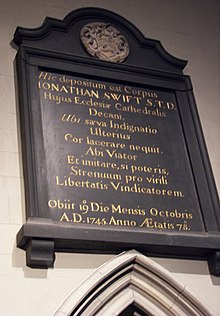Swift's Epitaph
Swift has sailed into his rest;
Savage indignation there
Cannot lacerate his Breast.
Imitate him if you dare,
World-Besotted Traveler; he
Served human liberty.
Original Latin version
Hic depositum est Corpus
IONATHAN SWIFT S.T.D.
Hujus Ecclesiæ Cathedralis
Decani,
Ubi sæva Indignatio
Ulterius
Cor lacerare nequit,
Abi Viator
Et imitare, si poteris,
Strenuum pro virili
Libertatis Vindicatorem.
Obiit 19º Die Mensis Octobris
A.D. 1745 Anno Ætatis 78º.
Literal Translation
Here is laid the Body
of Jonathan Swift, Doctor of Sacred Theology,
Dean of this Cathedral Church,
where fierce Indignation
can no longer
injure the Heart.
Go forth, Voyager,
and copy, if you can,
this vigorous (to the best of his ability)
Champion of Liberty.
He died on the 19th Day of the Month of October,
A.D. 1745, in the 78th Year of his Age.
This page is based on this
Wikipedia article Text is available under the
CC BY-SA 4.0 license; additional terms may apply.
Images, videos and audio are available under their respective licenses.
